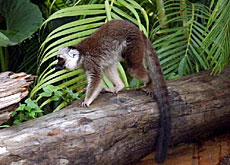Zurich Zoo celebrates 75th anniversary

Zurich’s zoo is celebrating its 75th anniversary with a series of special events to raise funds for new projects, including the construction of a state-of-the-art lion enclosure.
To mark the occasion, the zoo’s director, Alex Rübel, told swissinfo why zoos still have a role to play in giving people the chance to explore the animal kingdom.
The zoo in Switzerland’s largest city first opened its doors to the public on September 7, 1929, and clocked up its first record just one week later when 20,000 people visited the zoo in just one day.
A new chapter in the zoo’s history was turned in 2003 with the opening of a unique indoor rainforest. Twelve years in the making, the Masoala Rainforest hall gives visitors the opportunity to glimpse rare plants and animals in a realistic setting.
Rübel is a trained veterinary surgeon and has been in charge of the zoo since 1991.
swissinfo: Being the director of a zoo sounds like a dream job. But what exactly does your work entail?
Alex Rübel: It really is a fascinating job. I am a vet by trade and thought when I first took up the post that most of my time would be taken up dealing with the animals.
But as the director of the zoo I often give interviews and speeches. I think of myself as a public relations officer and as an ambassador for the animals. Fundraising is also part of my job. I have to show people both inside and outside the zoo why they should be concerned with animal welfare, convince them of our credibility and of the fact that we run a humane zoo.
swissinfo: How did the idea of building zoos first come about?
A.R.: Zoos are for many people emergency exits into nature. For a long time, most people couldn’t afford to travel to see animals in the wild. And we know how important it is to have contact with living animals in order to better understand them and their needs. You can’t be an animal lover, or protect them, if you haven’t had the chance to develop emotions about them.
swissinfo: Zurich Zoo is 75 years old. Is it fair to say that zoos constantly have to redefine themselves?
A.R.: The first zoos were built 200 years ago. At that time, people went to see exotic animals, something they would otherwise never have had the chance to do. That was also true of our zoo when it was founded.
Deforestation in the 1930s led to the extinction of many species. That’s why many zoos were transformed into refuges. In zoos – including the one in Zurich – breeding programmes began in order to preserve species.
A former director here in Zurich introduced animal biology and psychology to the zoo in the 1950s. He promoted animal-friendly captivity and breeding. Today, our breeding programmes are very successful. But we have to ask ourselves if this isn’t a lost cause if natural habitats are destroyed.
It’s easy to understand the role of zoos today. They must educate and make people understand the complexities of nature, because – as an African once told me – ‘man only protects what he loves’.
swissinfo: Is it possible to educate in Switzerland, where even the habitat of the common European hare is under threat?
A.R.: Natural habitats are disappearing around the world in a dramatic way. We are overusing our resources by about 20 per cent. That’s also true in Switzerland.
If we are unable to limit human population growth and our demand for greater wealth I am not optimistic about the future.
However, we must act to reverse the trends. It doesn’t matter whether we are talking about the European hare or a lemur from Madagascar.
We have to change our way of thinking – here in Switzerland too – and that’s what I’m trying to show here at the zoo.
swissinfo: You say the zoo has to be attractive if it is to draw visitors to hear your message. Is there not a danger that in the age of amusement parks it could become an animal Disneyland?
A.R.: I’m convinced the zoo can be attractive while remaining true to its principles. There will never be any amusement park rides here.
The animals are the main draw and we want to show them. I admit that it is sometimes a fine line, but having fun is not forbidden.
swissinfo: Do the animals understand that they live in captivity? Does the lion know that he can’t roam beyond the zoo’s fences?
A.R.: I don’t think so. Most of the animals were born in the zoo. I’m sure they don’t feel captive. It’s not important for them whether they are fenced in or not.
I’m convinced that the decisive factor is whether they can lead normal lives inside their enclosures. We need to make sure that they are with their families, that they are being fed and that life is interesting for them.
swissinfo: Do you have a favourite animal?
A.R.: No, even though I had a lot to do with rhinos, parrots and other animals when I worked as a volunteer in Basel and later as a vet.
What interests me is how animals cohabitate and how they live with the plant kingdom. We show in our Masoala Rainforest how animals can only survive in their natural habitats and not in zoos.
swissinfo, Beat Maurer
The 49-year-old veterinarian, Alex Rübel, has been director of Zurich Zoo since 1991.
The zoo drew 1.65 million visitors last year and reported a turnover of SFr22 million ($18 million).
The zoo’s management is using the anniversary to raise funds for the construction of a state-of-the-art lion enclosure, which is expected to cost up to SFr6 million.
The zoo’s most recent project was the building of the Masoala Rainforest hall, which opened last year. Unique in the world, it replicates a section of the ecosystem on the Madagascan peninsula of Masoala.

In compliance with the JTI standards
More: SWI swissinfo.ch certified by the Journalism Trust Initiative










You can find an overview of ongoing debates with our journalists here . Please join us!
If you want to start a conversation about a topic raised in this article or want to report factual errors, email us at english@swissinfo.ch.